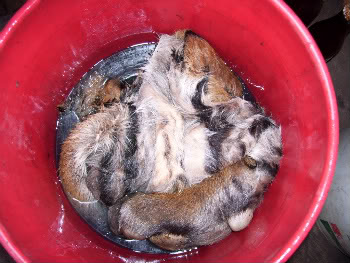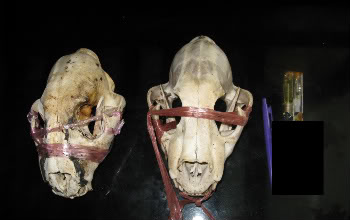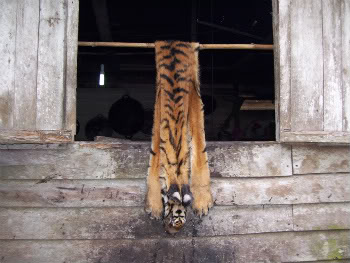|
|
The Sumatran tiger, a critically-endangered subspecies, is hanging on by a thread in its island home. Biologists estimate that at most 500 individuals remain with some estimates dropping as low as 250. Despite the animal’s vulnerability, large-scale deforestation continues in its habitat mostly under the auspices of one of the world’s largest paper companies, Asian Pulp and Paper (APP). Shrinking habitat and human encroachment has led to a rise in tragic tiger encounters, causing both human and feline mortalities.
While the connection between deforestation and tiger attacks has been put forth as a possible reason for the rise in attacks, a new study that looks at 12 years of tiger encounters confirms it. Eyes on the Forest, a coalition of 25 environmental organizations, has mapped out encounters between humans and tigers, many of which ended tragically, and found that the majority took place adjacent to forested areas being cleared by APP.
 A tiger skin in a bowl from the region. Photo courtesy of Eyes on the Forest. |
In Riau Province, Sumatra, 55 people and 15 tigers have lost their lives due to the conflict. An additional 17 tigers have been captured and removed from their habitat. The study found that sixty percent of the encounters, or 147 out of 245, between humans and tigers occurred in areas associated with expanded deforestation by APP and associated companies under the umbrella of Sinar Mas Group (SMG). The encounters in this area have cost 27 humans and eight tigers their lives.
Since 1985 Sumatra has lost half of its remaining forest. Worsening the situation for tigers is the continual decline of prey for the tigers due to heavy poaching by humans.
“With so much forest loss, the tigers have nowhere to go” said Ian Kosasih of WWF-Indonesia. “In the last month alone, four tigers have been killed in Riau. There are fewer than 400 Sumatran tigers estimated to remain in the wild and every tiger killed is a significant loss to the population of this critically endangered subspecies.”
 Two tiger skulls confiscated by Riau’s Forstry Officials. These are two of the four tigers that were killed in 2009 by villagers after straying into the village searching for food. Photo courtesy of WWF-Indonesia. |
Many have turned their criticism on APP for its relentless push into the forest while allegedly ignoring the needs of a critically-endangered species, their employees, and locals. Much of the logging done by the company in the region is ‘legally questionable’, according to Eyes on the Forest.
Since beginning operations in 1980, the company has been responsible for more deforestation in Sumatra than any other corporation It is estimated that APP has pulped 2.5 million acres in total. Calls for the company to stop logging natural forests by Eyes on the Forest and other NGOs have so far fallen on deaf ears. APP supplies Target and Unilever in the United States. Other corporations like Staples, Walmart, Home Depot, and the Australian company, Woolworths Limited, have all cut ties with the paper giant due to an increasingly troubling environmental record.
“APP/SMG-associated companies’ activities in Senepis [forest in the region] are legally questionable and environmentally reckless,” said Jhony Mundung from the local environmental organization Walhi Riau. “APP has recently made ridiculous public claims that it is leading tiger conservation in the area, when in fact it is jeopardizing the safety of local communities and pushing the tigers closer to local extinction. Global paper buyers should not be fooled: APP destroys forests and wildlife.”
 Tiger skin confiscated by authorities. Police annd officials say there is an indication that traps are being set for tigers. Photo courtesy of WWF-Indonesia. |
Criticism of APP in the region doesn’t stop with the corporation causing the current tiger-human conflict. Seven companies under the APP/SMG umbrella have been accused of illegal logging and one charged. The investigation of the others ended in December 2008 without warning, although last month the national Corruption Eradication Commission has pledged to resume the incomplete cases.
The company has also been accused of abusing human rights in Sumatra. Indigenous peoples have complained that companies under APP have seized their land, intimidated them, and prohibited their access to public areas.
According to Amnesty International, last December an APP company destroyed a village that had a longtime dispute over the company for land. Three hundred houses were reportedly burnt, 200 villagers arrested, 400 made homeless, and two children killed during the incident, one from burns and the other from falling down a well.
Riau Province has seen a sudden spark in international media interest due to the increasingly aggressive behavior from the tigers. Since late January nine people in the area have been killed by tigers, mostly illegal loggers. The incidences spread panic through the populace leading to the death of four tigers that strayed into a village searching for food, some speared by villagers. A current investigation of the tiger deaths has suggested that the killers may also have been motivated by the illegal trade of tiger parts.
Three subspecies of tigers went extinct in the last century alone: the Balinese tiger in 1937, the Caspian tiger in the 1950s, and the Javanese tiger in the 1980s.
Related articles
Tigers continue killing rampage in Indonesia
(03/03/2009)
Two more illegal loggers were attacked and killed Sunday night in Sungai Gelam district in Jambi Province on the island of Sumatra, reports the Jakarta Post. The deaths bring the total number of people killed by tigers in the province since January 24th to nine.
Deforestation blamed for tiger maulings in Sumatra
(02/27/2009)
WWF has attributed six recent killings of villagers by tigers to deforestation in Sumatra. Habitat loss — together with prey depletion by hunting — is believed to be driving tiger-human conflict on the Indonesia island.
Indonesian raids on tiger traffickers yielding arrests in Sumatra
(09/02/2008)
A raid on illegal tiger traders in Indonesia resulted in four arrests in Sumatra, reports the Wildlife Conservation Society (WCS). The arrests come under a new crack-down by Indonesian authorities on the sales of tiger parts. 10 traffickers have been arrested in the past 3 months.
$100 billion worth of carbon released from deforestation in Riau, Sumatra
(02/27/2008)
A WWF study found that deforestation of nearly 10.5 million acres of tropical forests and peat swamp in central Sumatra’s Riau Province over the past 25 years has generated 3.7 gigatons of carbon dioxide. Based on today’s $32 closing price for a ton of carbon dioxide for European Union Allowances, the emissions had a theoretical trading value of $118 billion, assuming they could have been traded at the full E.U. carbon price at the time (voluntary offsets would have been worth about $13 billion).
Sumatran tiger faces extinction due to wildlife trade
(02/12/2008)
The critically endangered Sumatran Tiger faces extinction due to the tiger parts trade in Indonesia, reports a new report from TRAFFIC, the wildlife trade monitoring network run by IUCN and WWF.
Rare three-legged tiger photographed in Sumatra
(07/06/2007)
A WWF camera trap has captured photos of a three-legged Sumatran tiger on the Indonesian island of Sumatra. WWF says the rare tiger likely escaped from a snare. The big cat seems otherwise healthy.